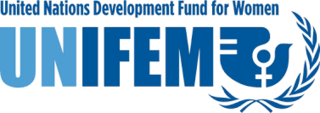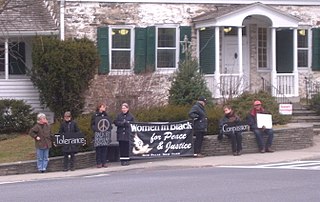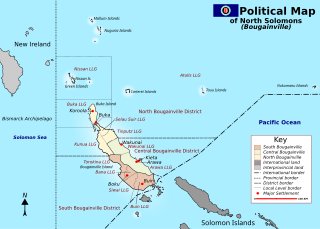
Kofi Atta Annan was a Ghanaian diplomat who served as the seventh secretary-general of the United Nations from 1997 to 2006. Annan and the UN were the co-recipients of the 2001 Nobel Peace Prize. He was the founder and chairman of the Kofi Annan Foundation, as well as chairman of The Elders, an international organisation founded by Nelson Mandela.

The United Nations, particularly informally also referred to as the United Nations Organisation, is an intergovernmental organization whose stated purposes are to maintain international peace and security, develop friendly relations amongst nations, achieve international co-operation, and be a centre for harmonizing the actions of nations. It is the world's largest and most familiar international organization. The UN is headquartered on international territory in New York City, and has other main offices in Geneva, Nairobi, Vienna, and The Hague.

The United Nations Security Council (UNSC) is one of the six principal organs of the United Nations (UN) and is charged with ensuring international peace and security, recommending the admission of new UN members to the General Assembly, and approving any changes to the UN Charter. Its powers include establishing peacekeeping operations, enacting international sanctions, and authorizing military action. The UNSC is the only UN body with the authority to issue binding resolutions on member states.

Bougainville, officially the Autonomous Region of Bougainville, is an autonomous region in Papua New Guinea. The largest island is Bougainville Island, while the region also includes Buka Island and a number of outlying islands and atolls. The current capital is Buka, situated on Buka Island.

Bougainville Island is the main island of the Autonomous Region of Bougainville, which is part of Papua New Guinea. It was previously the main landmass in the German Empire-associated North Solomons. Its land area is 9,300 km2 (3,600 sq mi). The population of the whole province, including nearby islets such as the Carterets, is approximately 300,000. The highest point is Mount Balbi, on the main island, at 2,715 m (8,907 ft). The much smaller Buka Island, c. 500 km2 (190 sq mi), lies to the north, across the 400–500 m (1,300–1,600 ft) wide Buka Strait. Even though the strait is narrow, there is no bridge across it, but there is a regular ferry service between the key settlements on either side. The main airport in the north is in the town of Buka.

The United Nations Development Fund for Women was established in December 1976 originally as the Voluntary Fund for the United Nations Decade for Women in the International Women's Year. Its first director was Margaret C. Snyder. UNIFEM provided financial and technical assistance to innovative programmes and strategies that promoted women's human rights, political participation and economic security. Since 1976 it supported women's empowerment and gender equality through its programme offices and links with women's organizations in the major regions of the world. Its work on gender responsive budgets began in 1996 in Southern Africa and expanded to include East Africa, Southeast Asia, South Asia, Central America and the Andean region. It worked to increase awareness throughout the UN system of gender responsive budgets as a tool to strengthen economic governance in all countries. In 2011, UNIFEM merged with some other smaller entities to become UN Women.
A non-state actor (NSA) are organizations and/or individuals that are not affiliated with, directed by, or funded by any government.
United Nations Security Council Resolution 1325 (S/RES/1325), on women, peace, and security, was adopted unanimously by the UN Security Council on 31 October 2000, after recalling resolutions 1261 (1999), 1265 (1999), 1296 (2000), and 1314 (2000). The resolution acknowledged the disproportionate and unique impact of armed conflict on women and girls. It calls for the adoption of a gender perspective to consider the special needs of women and girls during conflict, repatriation and resettlement, rehabilitation, reintegration, and post-conflict reconstruction.
Gender mainstreaming is the public policy concept of assessing the implications for people of different genders of a planned policy action, including legislation and programmes. Mainstreaming offers a pluralistic approach that values the diversity among people of different genders.
The Secretary's Office of Global Women's Issues is located within the United States Department of State. In 2009, Melanne Verveer was appointed to be the first Ambassador-at-Large for Global Women's Issues. From September 2013 to May, 2017, Catherine M. Russell was appointed to this position. From May 2017 through December 2019, there was no ambassador for this office. Kelley Currie, a political appointee, joined the Global Women's Issues Office as U.S. Ambassador-at-Large in January 2020.

Women in Black is a women's anti-war movement with an estimated 10,000 activists around the world. The first group was formed by Israeli women in Jerusalem in 1988, following the outbreak of the First Intifada.

The Bougainville conflict, also known as the Bougainville Civil War, was a multi-layered armed conflict fought from 1988 to 1998 in the North Solomons Province of Papua New Guinea (PNG) between PNG and the secessionist forces of the Bougainville Revolutionary Army (BRA), and between the BRA and other armed groups on Bougainville. The conflict was described by Bougainvillean President John Momis as the largest conflict in Oceania since the end of World War II in 1945, with an estimated 15,000–20,000 Bougainvilleans dead, although lower estimates place the toll at around 1,000–2,000.

Meenakshi Gopinath is an Indian educationist, political scientist, writer and a former principal of Lady Shri Ram College, New Delhi. She is the founder and incumbent director of the Women in Security Conflict Management and Peace (WISCOMP), a non governmental organization promoting peace and socio-political leadership among the women of South Asia and a former member of the National Security Advisory Board, the first woman to serve the Government of India agency. She has served as a member of the selection panel of the Lokpal, a legal body which has jurisdiction over the legislators and government officials of India. The Government of India awarded her the fourth highest civilian honour of the Padma Shri, in 2007, for her contributions to Indian educational sector. She is a co-editor of the International Feminist Journal of Politics, the leading journal of feminist international relations and global politics.

Nadia Murad Basee Taha is an Iraqi Yazidi human rights activist who lives in Germany. In 2014, she was kidnapped from her hometown Kocho and held by the Islamic State for three months.

International Alert is a global peacebuilding charity. It offers dialogue, training, research, policy analysis, advocacy and outreach activities focusing on solving the root causes of conflict with people from across divides.
Veneranda Nzambazamariya was a women's leader in Rwanda. She was posthumously awarded the Millennium Peace Prize for Women.
World Conference on Women, 1975 was held between 19 June and 2 July 1975 in Mexico City, Mexico. It was the first international conference held by the United Nations to focus solely on women's issues and marked a turning point in policy directives. After this meeting, women were viewed as part of the process to develop and implement policy, rather than recipients of assistance. The conference was one of the events established for International Women's Year and led to the creation of both the United Nations Decade for Women and follow-up conferences to evaluate the progress that had been made in eliminating discrimination against women and their equality. Two documents were adopted from the conference proceedings, the World Plan of Action which had specific targets for nations to implement for women's improvement and the Declaration of Mexico on the Equality of Women and Their Contribution to Development and Peace, which discussed how nations foreign policy actions impacted women. It also led to the establishment of the International Research and Training Institute for the Advancement of Women to track improvements and continuing issues and the United Nations Development Fund for Women to provide funding for developmental programs. The conference marked the first time that the parallel Tribune meeting was successful in submitting input to the official meeting and became a catalyst for women's groups to form throughout the world.
Helen Samu Hakena is an organiser and campaigner for peace and women's rights from Bougainville, Papua New Guinea. In 1992 she co-founded the Leitana Nehan Women’s Development Agency to help restore peace to the island. The organisation contributes humanitarian assistance, provides education programs on peace, gender issues and community development, and advocates for women’s and children’s rights. In 2000 the agency's work was recognised with a United Nations’ Millennium Peace Prize, and a Pacific Peace Prize in 2004.
Thelma Arimiebi Ekiyor is a Nigerian social entrepreneur and impact investor who has served in authoritative positions within many organizations. Ekiyor has focused primarily on investing in women entrepreneurs. She started her career supporting women in peacebuilding and empowering women and youth through financial independence and educational access. She has experience with projects in more than 22 African countries. Ekiyor worked in post-conflict countries such as Liberia with the peace activist Leymah Gbowee.











